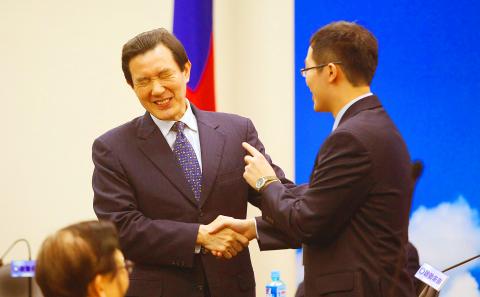President Ma Ying-jeou (馬英九) yesterday defended the Chinese Nationalist Party’s (KMT) Sun Yat-sen Scholarship program and stressed the advantages of studying abroad.
Ma, who doubles as KMT chairman, yesterday met with 10 recipients of the scholarship at the KMT headquarters, and encouraged them to dedicate their knowledge and talents to the nation after completing what he called a “formal learning process” as compared with working holidays or short-term language courses.
“Studying abroad is a major force for modernizing the nation. Although Taiwan has developed over the years, there is still a lot to learn from advanced countries. Most importantly, you should nurture yourself and become a talent that the nation needs,” he said.

Photo: CNA
Ma, a recipient of the scholarship in 1974, said his family was not able to finance his graduate studies at New York University, and expressed his gratitude for the scholarship giving him the opportunity to broaden his horizons and complete his studies.
“That’s why I decided to reinstate the scholarship in 2010. The scholarship does not aim to train KMT members. Our goal is to cultivate talents for the country, so that more young people will receive a good education and make contributions to Taiwan,” he said.
The KMT launched the scholarship program in 1960 to send outstanding young party members abroad for advanced studies. The KMT used the program to cultivate talent within its own ranks, encouraging its members to apply for the program, while assigning political missions to scholarship recipients.
Many of the recipients became KMT heavyweights and top politicians, including Ma, Taiwan’s Representative to the US King Pu-tsung (金溥聰) and former Straits Exchange Foundation chairman Chiang Pin-kung (江丙坤).

US climber Alex Honnold is to attempt to scale Taipei 101 without a rope and harness in a live Netflix special on Jan. 24, the streaming platform announced on Wednesday. Accounting for the time difference, the two-hour broadcast of Honnold’s climb, called Skyscraper Live, is to air on Jan. 23 in the US, Netflix said in a statement. Honnold, 40, was the first person ever to free solo climb the 900m El Capitan rock formation in Yosemite National Park — a feat that was recorded and later made into the 2018 documentary film Free Solo. Netflix previewed Skyscraper Live in October, after videos

NUMBERS IMBALANCE: More than 4 million Taiwanese have visited China this year, while only about half a million Chinese have visited here Beijing has yet to respond to Taiwan’s requests for negotiation over matters related to the recovery of cross-strait tourism, the Tourism Administration said yesterday. Taiwan’s tourism authority issued the statement after Chinese-language daily the China Times reported yesterday that the government’s policy of banning group tours to China does not stop Taiwanese from visiting the country. As of October, more than 4.2 million had traveled to China this year, exceeding last year. Beijing estimated the number of Taiwanese tourists in China could reach 4.5 million this year. By contrast, only 500,000 Chinese tourists are expected in Taiwan, the report said. The report

Temperatures are forecast to drop steadily as a continental cold air mass moves across Taiwan, with some areas also likely to see heavy rainfall, the Central Weather Administration (CWA) said. From today through early tomorrow, a cold air mass would keep temperatures low across central and northern Taiwan, and the eastern half of Taiwan proper, with isolated brief showers forecast along Keelung’s north coast, Taipei and New Taipei City’s mountainous areas and eastern Taiwan, it said. Lows of 11°C to 15°C are forecast in central and northern Taiwan, Yilan County, and the outlying Kinmen and Lienchiang (Matsu) counties, and 14°C to 17°C

STEERING FAILURE: The first boat of its class is experiencing teething issues as it readies for acceptance by the navy, according to a recent story about rudder failure The Hai Kun (海鯤), the nation’s first locally built submarine, allegedly suffered a total failure of stern hydraulic systems during the second round of sea acceptance trials on June 26, and sailors were forced to manually operate the X-rudder to turn the submarine and return to port, news Web site Mirror Daily reported yesterday. The report said that tugboats following the Hai Kun assisted the submarine in avoiding collisions with other ships due to the X-rudder malfunctioning. At the time of the report, the submarine had completed its trials and was scheduled to begin diving and surfacing tests in shallow areas. The X-rudder,